Twoson’s Name
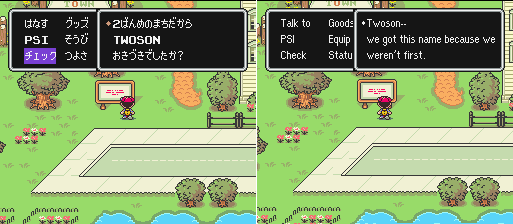 |
When you first enter Twoson in EarthBound, you’re greeted by a sign that says, “Twoson– we got this name because we weren’t first.” In MOTHER 2, the sign says, “This is the second town, so it’s called ‘Twoson’. Did you notice?”
The joke is plainly spelled out for the player in MOTHER 2, basically. I think explaining the joke so clearly like that makes it less funny, but whatever.
Twoson’s Map
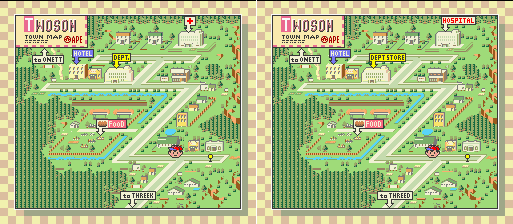 |
Just like with Onett, the town map has been altered slightly. “DEPT” was changed to “DEPT STORE”, the Os in “FOOD” were made slightly bigger, and the red cross was changed to “HOSPITAL”.
Then, of course, is the change from “THREEK” to “THREED”, but that will be brought up in more detail later 😛
Twoson Hospital
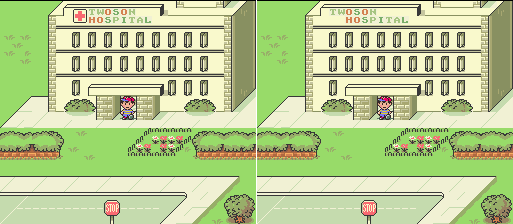 |
Yep, the hospital changed again. The MOTHER 2 hospital has a red cross on it, but the EarthBound version doesn’t. This time, to cover up the changes, they moved the text around. I wonder who the lucky guy who had the job of “Official Cross Remover” was.
Twoson Newspaper Business
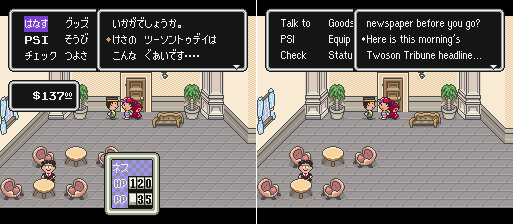 |
Twoson’s newspaper is known as “Twoson Today” in MOTHER 2, but it’s called “Twoson Tribune” in EarthBound. I have no idea why they changed this.
Bicycle Shop Puns
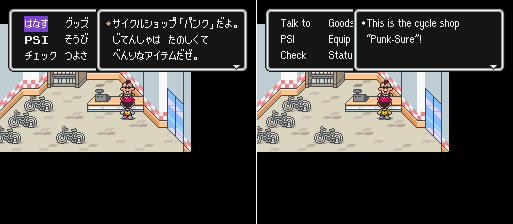 |
In MOTHER 2, the Bicycle Shop’s name is “Panku”, which means two things at once — “flat tire” and “punk”. That’s why the punk guy runs the shop 😛 The pun here is pretty obvious in Japanese, so it’s pretty funny.
In EarthBound, the shop’s name is “Punk-Sure”. While the double-meaning doesn’t jump out as quickly as its Japanese counterpart, the word play still works the same. “Punk-Sure” referring to a tire “puncture”, and the fact that the guy’s a punk.
This is both enlightening and a cool example of a Japanese pun that actually transfers over well in the localization process – something that’s quite rare in the translation world.
Seating Arrangements
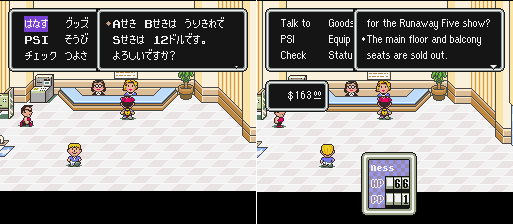 |
The main floor and balcony seats are called the A seats and B seats in MOTHER 2. In addition, the box seats are called S seats. Nothing too special about this, to be honest. But now maybe you know more about Japanese concert ticket lingo!
Twoson Sign Changes
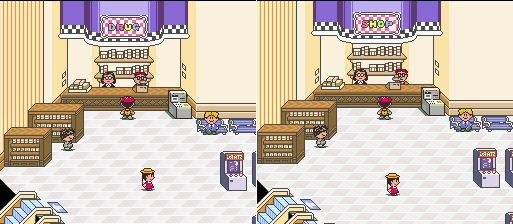 |
This one almost escaped notice! In the Twoson department store, the text above the shop at the top floor says “DRUG” in MOTHER 2, but says “SHOP” in EarthBound. This appears to be another attempt by the localizers to skirt around the word “drug”. Why they left it alone in the Dusty Dunes Desert is unknown, though.
Burglin Park’s Name
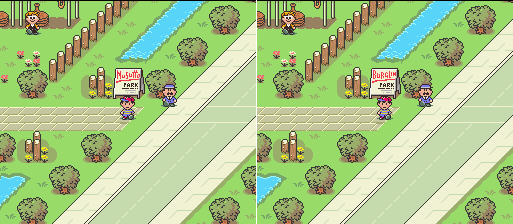 |
As we saw in the intro credits, Burglin Park is known as Nusutto Park in MOTHER 2. Nusutto means “burglar” in Japanese.
Cross Removal Exception
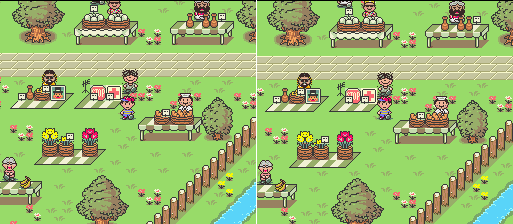 |
All the red crosses in the game so far have gotten the editing treatment… except for the one in Burglin Park. It’s most likely not edited because the whole thing isn’t showing in this instance.
Everdred’s Name
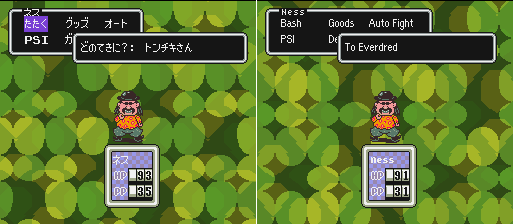 |
In EarthBound, you meet a hard-nosed criminal named Everdred who runs Burglin Park. But in MOTHER 2, his name is actually Tonchiki. “Tonchiki” means something like “dimwit” or “numbskull”.
Everdred Speaks
 |
Some things in Everdred’s speech were glossed over or left out when the game was localized into English. This is the case with many little things in EarthBound, but in this instance, it might serve as interesting trivia.
First, in MOTHER 2, Everdred tells Ness he has a secret cabin in Peaceful Rest Valley (actually Grateful Dead Valley) and that he lent it/rented it out. So that cabin Paula is in actually belongs to Everdred. Neat!
Incidentally, in MOTHER 2, it’s more obvious from stuff like this that Everdred’s a pretty shady guy. In EarthBound, he’s clearly not a “good” guy, but he seems almost kind of happy-go-lucky. But in the Japanese version, the feeling that he REALLY IS connected to kidnappings, murders, robberies, etc. is more palpable.
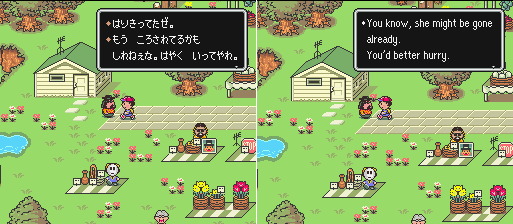 |
Next, the localizers did some more dancing around death and dying and murder and stuff. In MOTHER 2, Everdred says, “She may’ve been killed already, so hurry and go there.” To avoid the reference to killing, the localizers had him say, “You know, she might be gone already. You’d better hurry.”
The Runaway Five’s Name
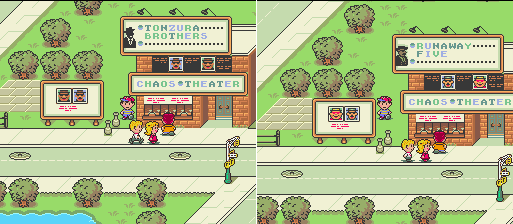 |
In EarthBound, Ness and company help out a band named the “Runaway Five” despite having more than five members.
In MOTHER 2, the band is called the “Tonzura Brothers”, which in English means “Runaway Brothers”.
We can also see here that the image used on the billboard is slightly different in both games.
Poochyfud’s Name
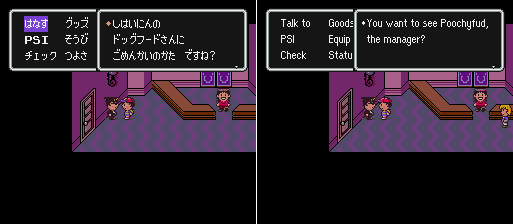 |
The manager of the Chaos Theater in Twoson is known as Mr. Poochyfud to EarthBound players. But in MOTHER 2 his name is Mr. Dogfood.
Line Comedy
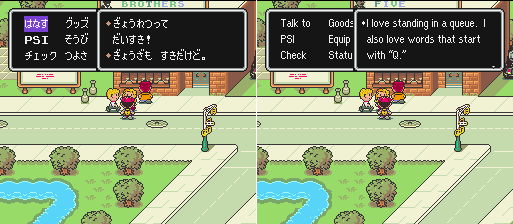 |
In MOTHER 2, this lady says she loves lines (gyoretsu), and that she also loves potstickers (gyoza).
In EarthBound, she says she loves standing in queues, and that she also loves words that start with the letter Q.
Paula’s Family and Religion
 |
In MOTHER 2, Paula’s mom tells Ness not to worry about Paula, because “God is with her”. In EarthBound, this was localized to “She has a guardian angel, it seems.”
It’s pretty well-known that NOA didn’t want any religious stuff in their games back then, so this change is to be expected.
Cultural Reference Lost in Translation
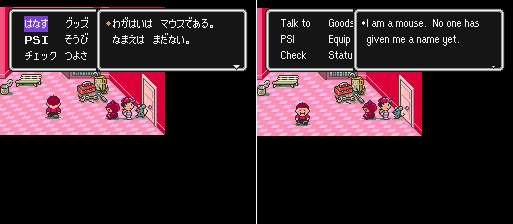 |
MOTHER series creator Shigesato Itoi is a very cultured fellow, so his games are full of little cultural references. Being non-native and not even a fraction as Japanese-culture-knowing as Itoi, I’m sure I miss a lot of the references he throws in, but here’s a more obvious one that sticks out.
In MOTHER 2, Apple Kid’s mouse says, “Wagahai wa mausu de aru”, which translates into, “I am a mouse.” This is a reference to the famous novel, Wagahai wa neko de aru, written by Natsume Soseki in the early 1900s.
Peaceful Rest Valley’s Name
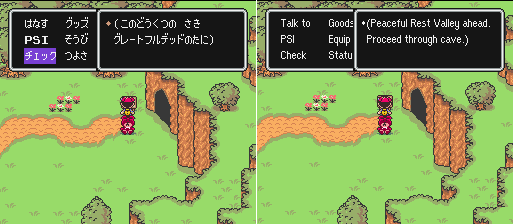 |
Peaceful Rest Valley, as it’s known in EarthBound, is called Grateful Dead Valley in MOTHER 2. The change was made to avoid getting in legal trouble with these folks.
Octopuses Become Pencils
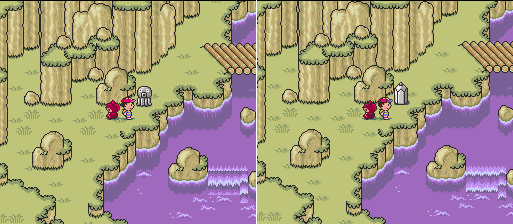 |
Here’s one of the most famous differences between these two games. In MOTHER 2, you must destroy a statue shaped like an octopus to continue. But in EarthBound, you have to destroy a pencil-shaped statue intead.
But that’s not all. In MOTHER 2, Apple Kid gives you the “Octopus Erasing Machine”. In EarthBound, he gives you the “Pencil Eraser”. Both are used to destroy the statue so that you may continue your quest.
And in MOTHER 2, Apple Kid warns that the “Octopus Erasing Machine” shouldn’t be used near shops that sell takoyaki octopus dumplings. In EarthBound, he tells you not to use the “Pencil Eraser” near shops that sell pencils. Interesting.
- Further details on what the Japanese “S” rank means, including its origin and usage throughout the past 100 years
- Details on some rarely-seen lines spoken by the bicycle shop owner, including info on game mechanic/programming changes made during localization
- A typo in MOTHER 2’s script, how it was fixed in MOTHER 1+2, and what became of the typo in later ports/re-releases
- A summary of typos found in EarthBound, including some few players have ever seen!
- The use of an added accent in localization to match the context
- A line in Burglin Park that was continually rewritten in every version of MOTHER 2 due to ratings issues
- A closer look at the Runaway Five and their similarities to the Blues Brothers
- Trivia about the sixth member of the Runaway Five, including the member’s official name!
- The official changes made to the Runaway Five’s artwork outside of the game, as used in guides, magazines, etc.
- A summary of why the Runaway Five’s costume changes backfired
- The ongoing mystery of the Runaway Five members’ official names, complete with examples from official sources and merchandise
- Everdred’s first name
- The preschooler who acts like an adult, and how he’s different in both games
- A look at how Christianity has been used in other Japanese games, old and new – including Link praying to Jesus
- Paula’s father and his response to “media monkeys”
- Further details on “I Am a Cat”, the famous Natsume Soseki novel referenced by Apple Kid’s mouse
- A closer look at the Grateful Dead and MOTHER 2
- Many more details behind the octopus/pencil statue change, including Shigesato Itoi’s reasoning for using an octopus + a beta screenshot of EarthBound showing the octopus intact
- A look at what “takoyaki” is
- What happens when you use key items on strange things for unexpected results


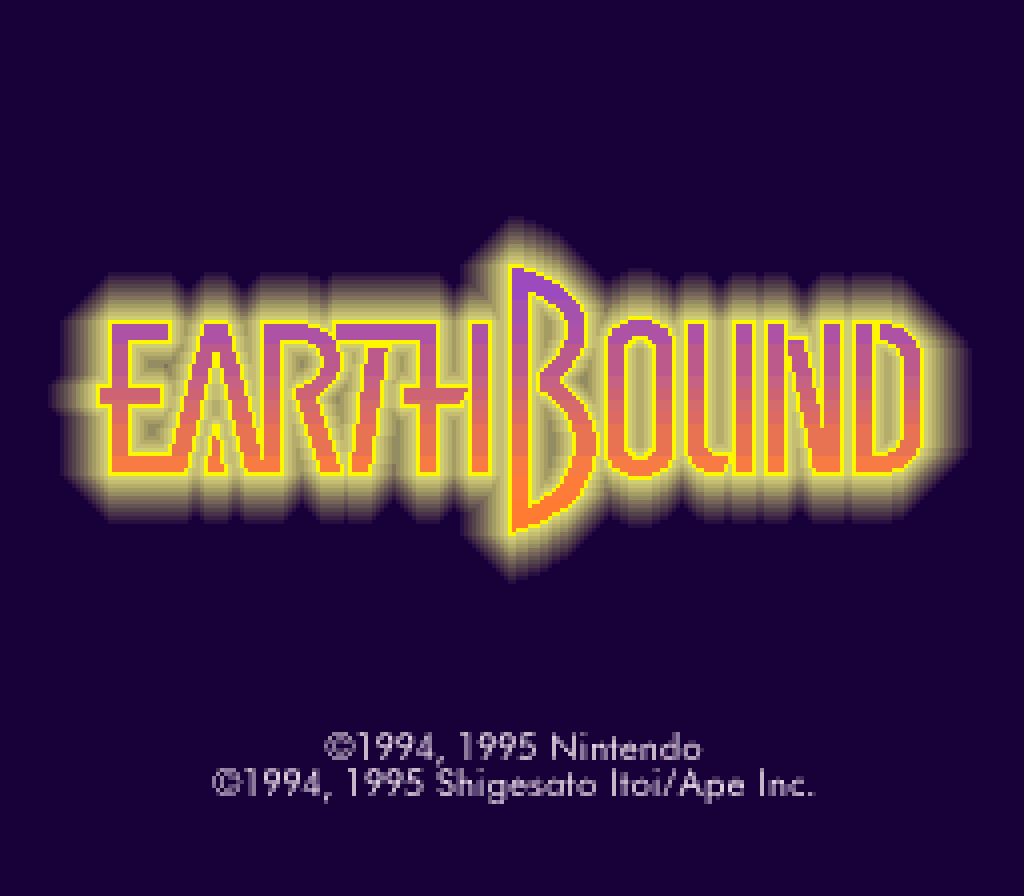
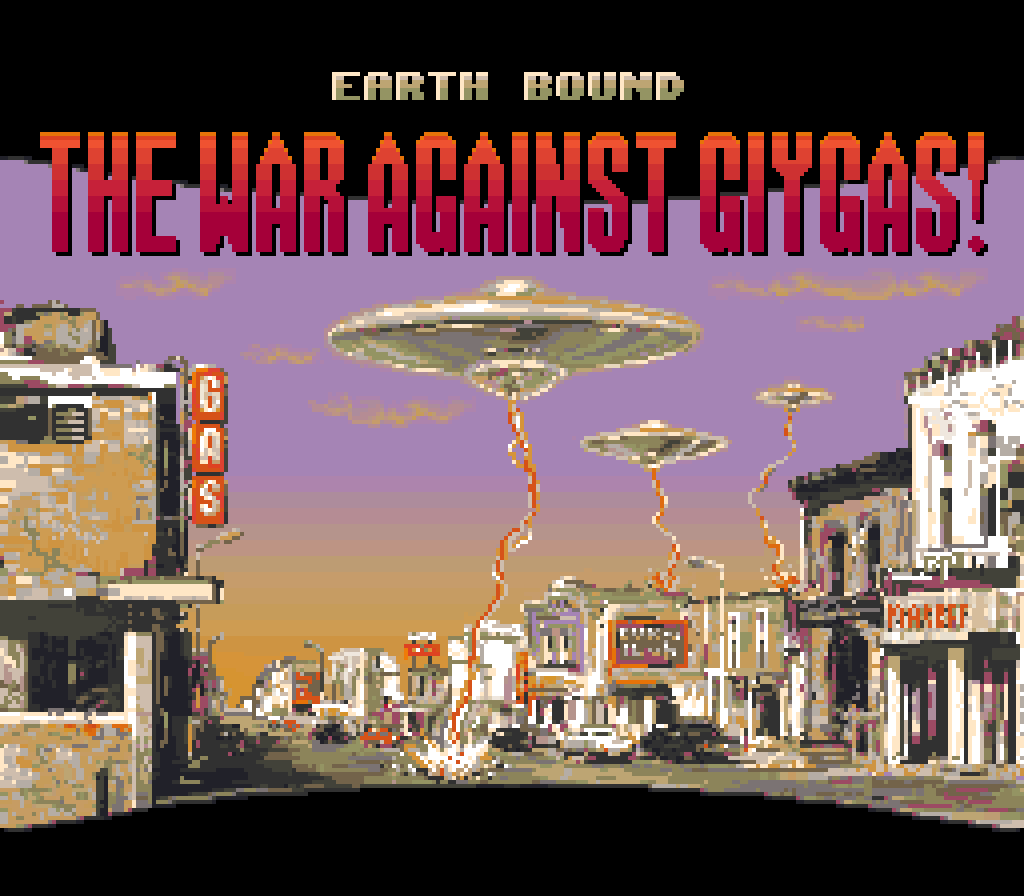
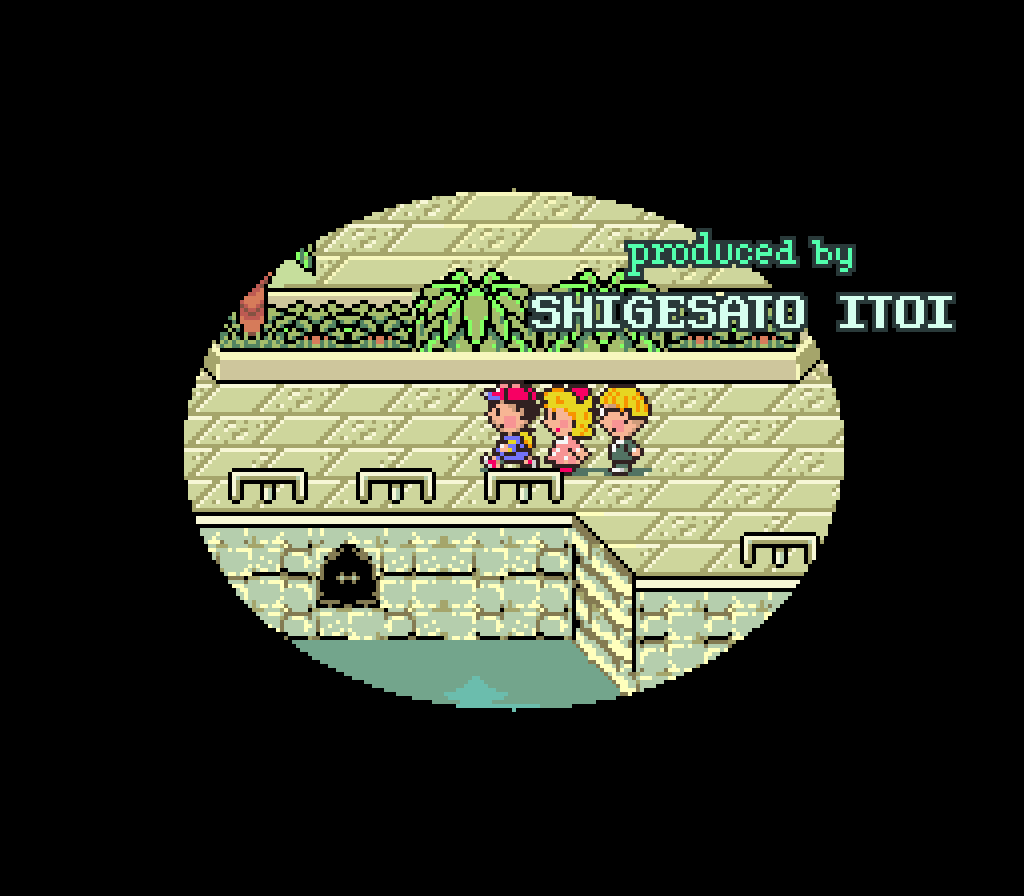
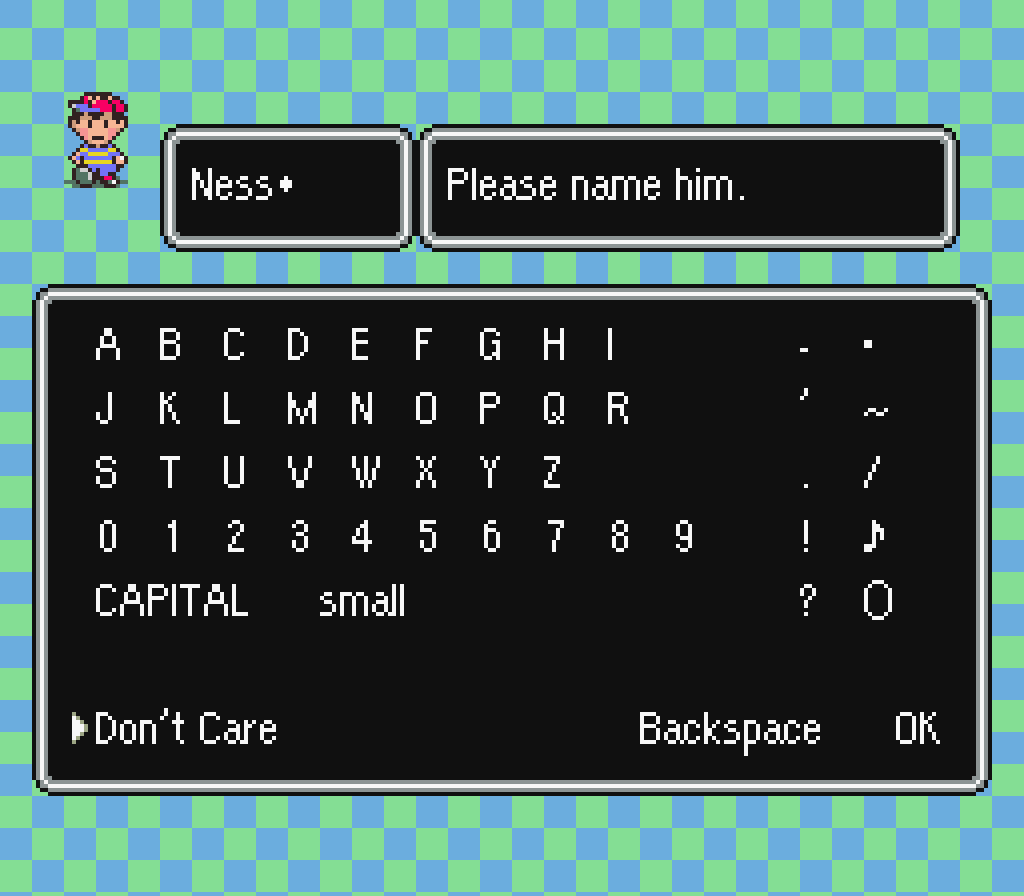
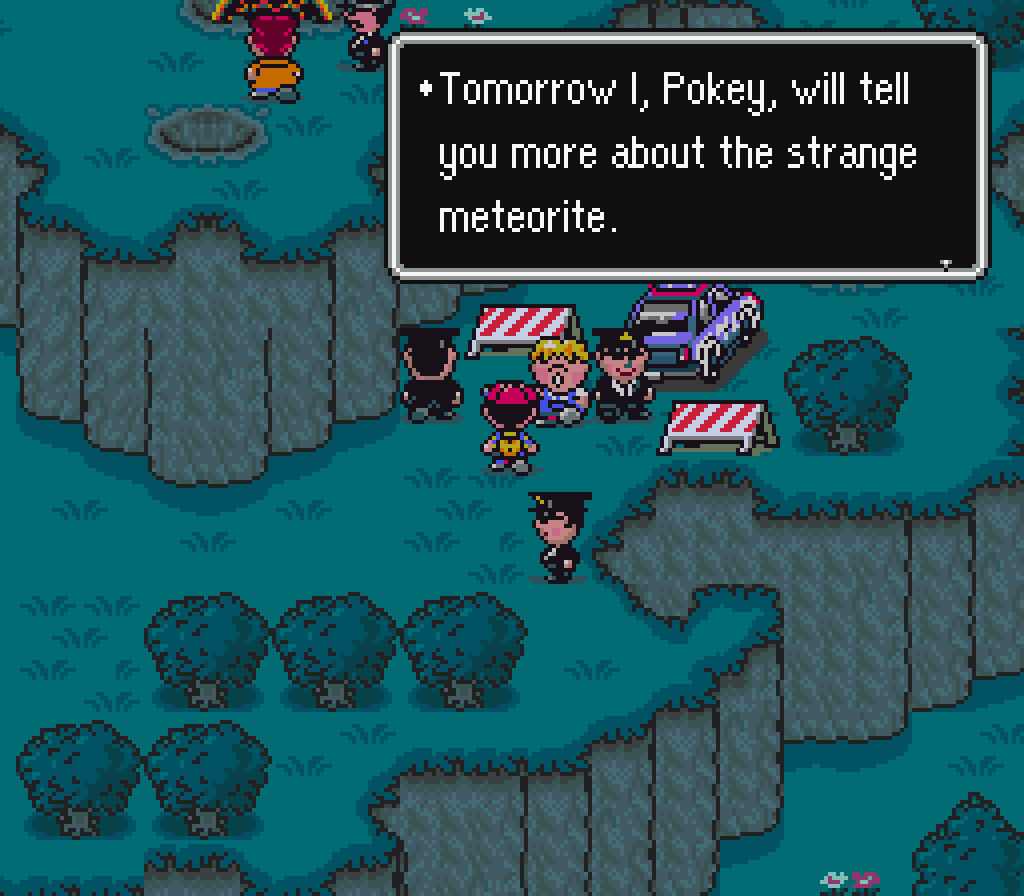
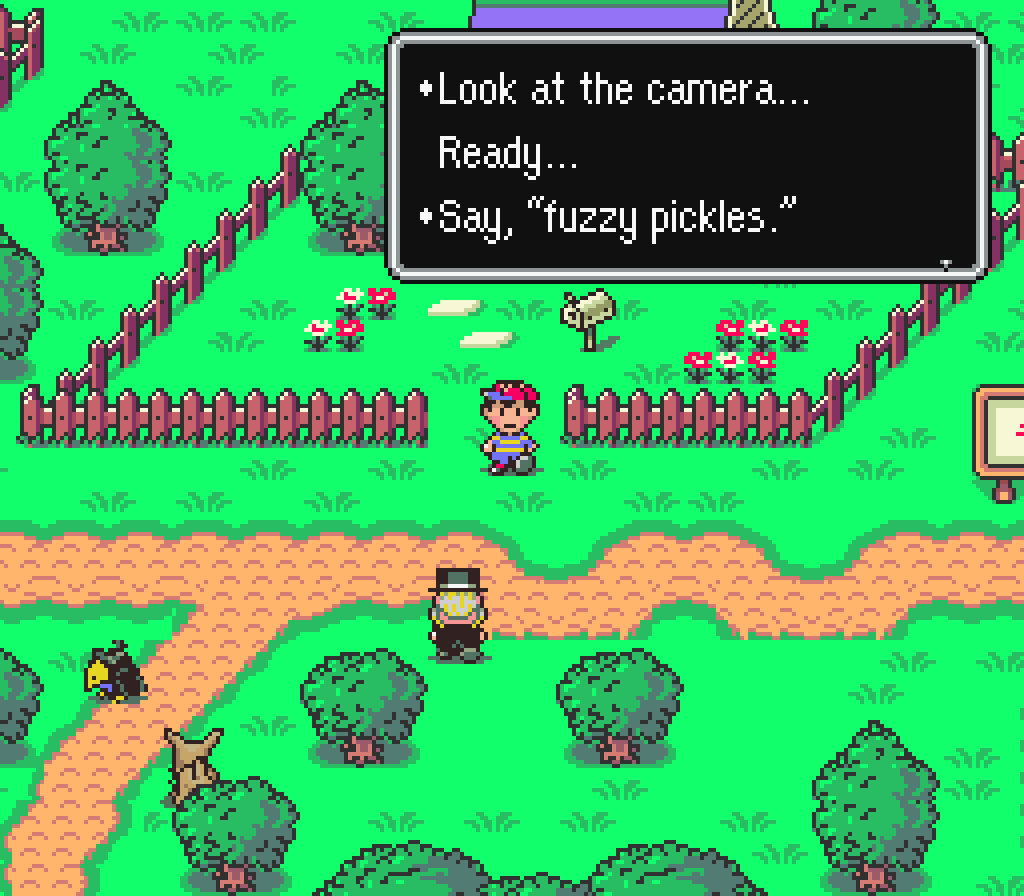
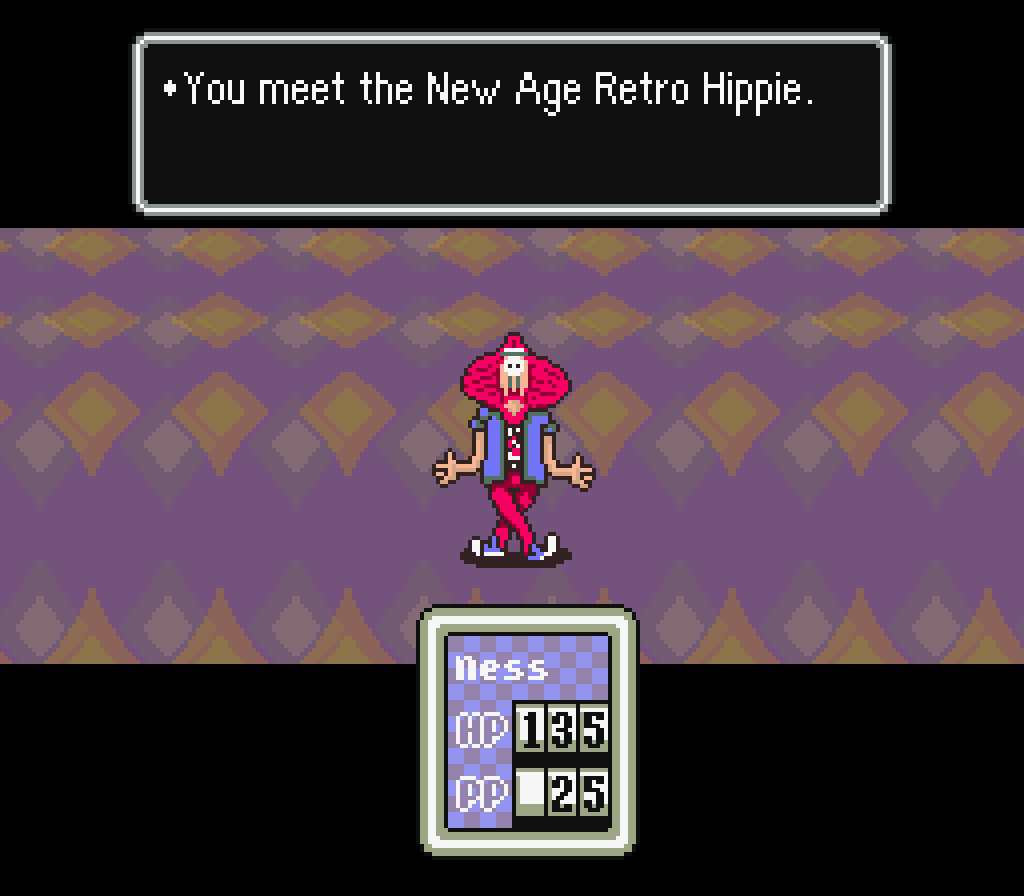
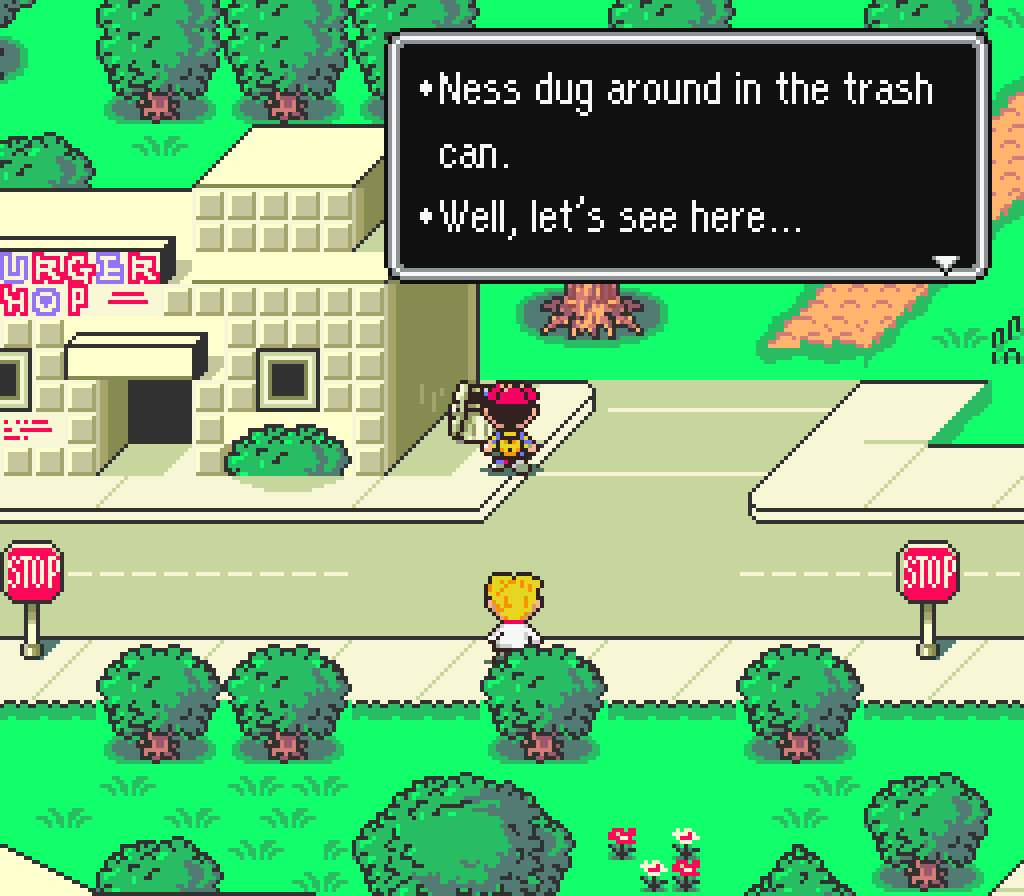
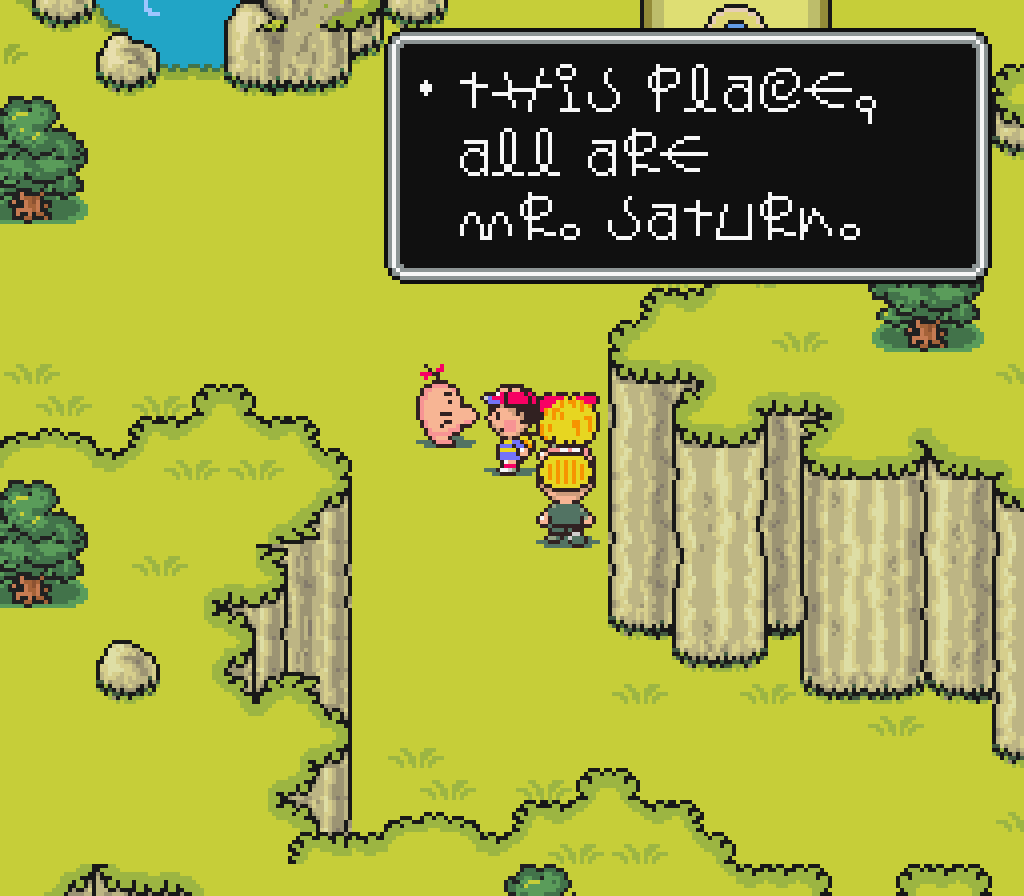
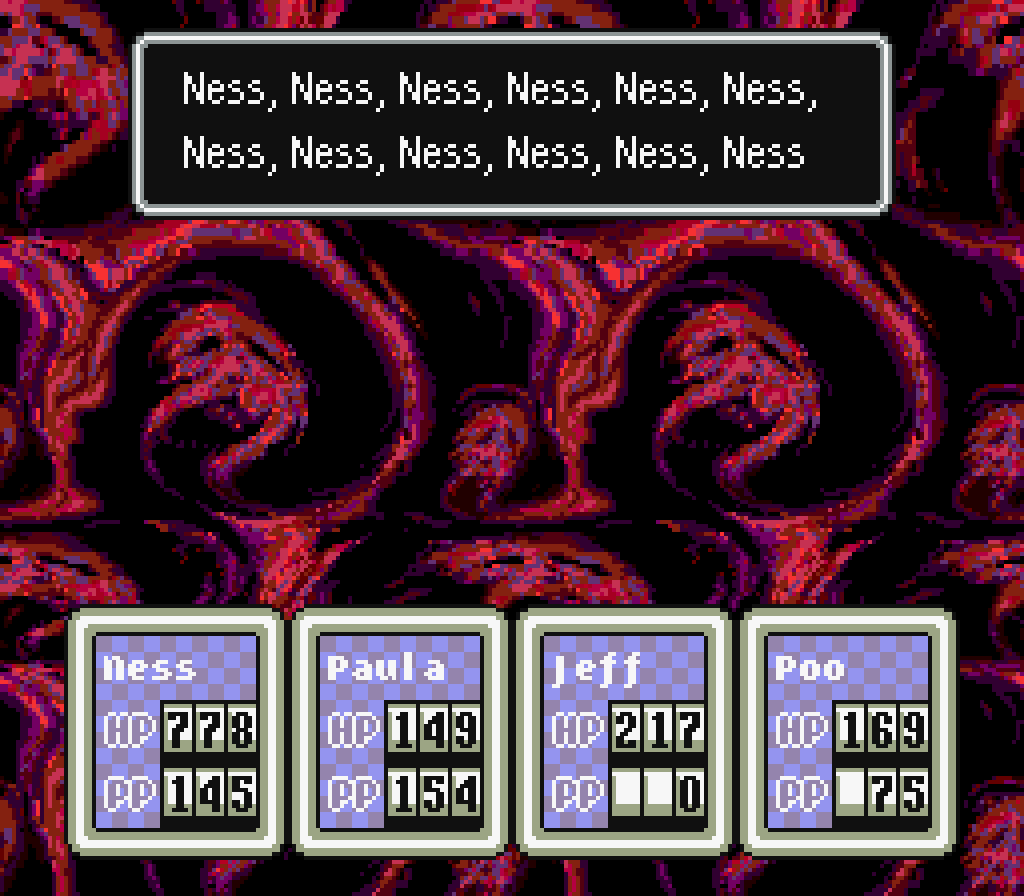
![Passport to MOTHER 2 [Learn Japanese!] Passport to MOTHER 2 [Learn Japanese!]](https://legendsoflocalization.com/wp-content/uploads/2018/05/pp-m2.jpg)
No Comments